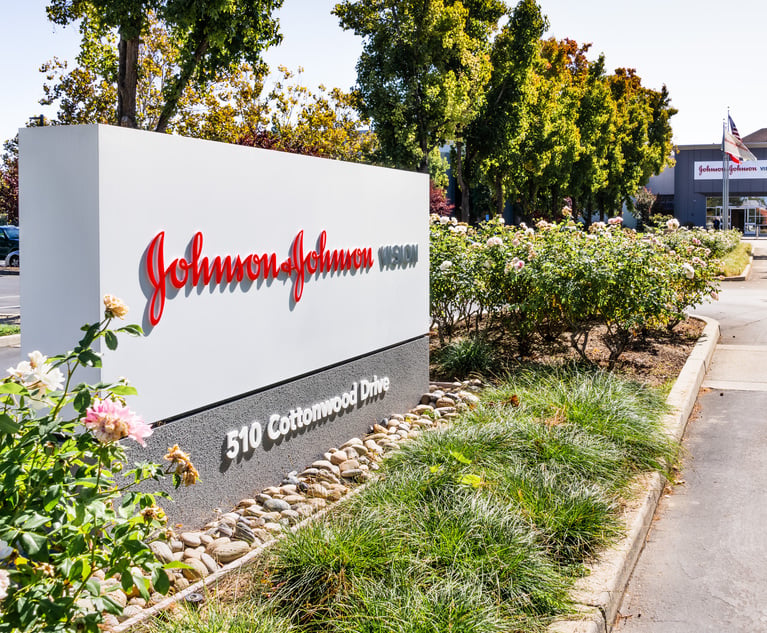Transit Agency and Union Fight Consolidation of Pa. Opioid Litigation, Warning of 'Catch-and-Kill' Jurisdiction Fights
The warning comes as part of the companies' efforts to fight having their cases consolidated with more than a dozen opioid lawsuits that were brought into the Delaware County Court of Common Pleas.
March 13, 2019 at 03:16 PM
4 minute read
 SEPTA train. Photo: Wiki/Adam E. Moreira
SEPTA train. Photo: Wiki/Adam E. Moreira
Letting a trial court give a party the ability to unilaterally transfer similar cases into consolidated actions could lead to large-scale “catch-and-kill” operations, the Southeastern Pennsylvania Transportation Authority—the Philadelphia area's regional mass transit agency—and a labor union have told a Pennsylvania appellate court.
The warning comes as part of the companies' efforts to fight having their cases consolidated with more than a dozen opioid lawsuits that were brought into the Delaware County Court of Common Pleas.
SEPTA and United Food and Commercial Workers Local 23 filed briefs with the Pennsylvania Superior Court on Monday, arguing that their cases against numerous drug companies should not be consolidated with more than a dozen lawsuits over the same drugs, and that the Delaware County court failed to allow proper briefing on the consolidation issue.
“Although perhaps animated by concerns regarding efficiency, the trial court has unwisely conferred an extrajudicial privilege upon the party-defendants in the coordinated cases by permitting them to unilaterally 'notice' cases for transfer,” SEPTA and UFCW said in the brief filed by Anapol Weiss attorney David Senoff. “Worse, the trial court has taken decisive action in transferring and coordinating appellants without sufficient concerns for due process, findings of fact, or appellants' original choice of venue.”
The companies further warned the intermediate appellate court that if parties were allowed to have cases consolidated without proper proceedings, the venue rules could be regularly abused.
“Beyond the particularities of the instant controversy, the trial court's seemingly passive oversight of these Rules 213.1 proceedings has serious implication for the future of orderly functioning of the courts of common pleas and could well incentivize the abuse of Rule 213.1 to conduct high-volume 'catch-and-kill' operations upon pending civil actions, with no oversight mechanism like the federal court's Judicial Panel on Multidistrict Litigation,” the companies said.
The jurisdiction dispute comes after more than a dozen counties, Philadelphia and Pennsylvania sued opioid makers, alleging that the companies used deceptive marketing tactics to increase sales of opioids and failed to properly warn about the risks for addiction. The suits generally contended that drug companies should be made to pay for money the municipalities spent on services to combat the opioid crisis, including emergency response, health and court services.
Numerous companies, including SEPTA and the UFCW, also sued over the same drugs. Those companies sued as “third-party payors,” and, unlike the municipalities, which are seeking recoveries for the “public nuisance” the drugs have caused, the third-party payors are seeking reimbursement for opioids they bought, either directly or through reimbursements, for workers.
Both SEPTA, which sued five companies, and UFCW, which sued 10 companies, filed their lawsuits in the Philadelphia Court of Common Pleas.
In January 2018, the parties in the action filed by Delaware County filed a joint motion seeking pretrial coordination. The motion, which said the Delaware County action was the first of the Pennsylvania cluster of opioid litigation, asked that “any future similar action” be consolidated as well.
The Delaware County Court of Common Pleas agreed and entered an order consolidating the cases in March 2018.
SEPTA and the UFCW contended they were not identified in the trial court's order, but brought in after consolidation, and were not given the proper opportunity to contest the consolidation. They further contended their claims were significantly different than those brought by the municipalities.
The companies also noted that the Delaware County case was removed to the U.S. District Court for the Eastern District of Pennsylvania in December, and since then the consolidated proceedings have “collapsed.”
“The trial court has wandered far beyond the bounds of acceptable practice, procedure and discretion,” the companies said in the brief, also noting in a footnote that three separate judges have handled the case since March 2018.
The press office of Endo Pharmaceuticals, a defendant in the action that had pushed for consolidating the litigation, did not immediately return a call seeking comment.
This content has been archived. It is available through our partners, LexisNexis® and Bloomberg Law.
To view this content, please continue to their sites.
Not a Lexis Subscriber?
Subscribe Now
Not a Bloomberg Law Subscriber?
Subscribe Now
NOT FOR REPRINT
© 2025 ALM Global, LLC, All Rights Reserved. Request academic re-use from www.copyright.com. All other uses, submit a request to [email protected]. For more information visit Asset & Logo Licensing.
You Might Like
View All
Ozempic Defendants Seek to Shave 'Tacked On' Claims From MDL Complaint
3 minute read
Plaintiff Argues Jury's $22M Punitive Damages Finding Undermines J&J's Talc Trial Win
4 minute read
'Discordant Dots': Why Phila. Zantac Judge Rejected Bid for His Recusal
3 minute read
Pittsburgh Jury Tries to Award $22M Against J&J in Talc Case Despite Handing Up Defense Verdict
4 minute readTrending Stories
- 1Law Firms Expand Scope of Immigration Expertise, Amid Blitz of Trump Orders
- 2Latest Boutique Combination in Florida Continues Am Law 200 Merger Activity
- 3Sarno da Costa D’Aniello Maceri LLC Announces Addition of New Office in Eatontown, NJ, and Named Partner
- 4Friday Newspaper
- 5Public Notices/Calendars
Who Got The Work
J. Brugh Lower of Gibbons has entered an appearance for industrial equipment supplier Devco Corporation in a pending trademark infringement lawsuit. The suit, accusing the defendant of selling knock-off Graco products, was filed Dec. 18 in New Jersey District Court by Rivkin Radler on behalf of Graco Inc. and Graco Minnesota. The case, assigned to U.S. District Judge Zahid N. Quraishi, is 3:24-cv-11294, Graco Inc. et al v. Devco Corporation.
Who Got The Work
Rebecca Maller-Stein and Kent A. Yalowitz of Arnold & Porter Kaye Scholer have entered their appearances for Hanaco Venture Capital and its executives, Lior Prosor and David Frankel, in a pending securities lawsuit. The action, filed on Dec. 24 in New York Southern District Court by Zell, Aron & Co. on behalf of Goldeneye Advisors, accuses the defendants of negligently and fraudulently managing the plaintiff's $1 million investment. The case, assigned to U.S. District Judge Vernon S. Broderick, is 1:24-cv-09918, Goldeneye Advisors, LLC v. Hanaco Venture Capital, Ltd. et al.
Who Got The Work
Attorneys from A&O Shearman has stepped in as defense counsel for Toronto-Dominion Bank and other defendants in a pending securities class action. The suit, filed Dec. 11 in New York Southern District Court by Bleichmar Fonti & Auld, accuses the defendants of concealing the bank's 'pervasive' deficiencies in regards to its compliance with the Bank Secrecy Act and the quality of its anti-money laundering controls. The case, assigned to U.S. District Judge Arun Subramanian, is 1:24-cv-09445, Gonzalez v. The Toronto-Dominion Bank et al.
Who Got The Work
Crown Castle International, a Pennsylvania company providing shared communications infrastructure, has turned to Luke D. Wolf of Gordon Rees Scully Mansukhani to fend off a pending breach-of-contract lawsuit. The court action, filed Nov. 25 in Michigan Eastern District Court by Hooper Hathaway PC on behalf of The Town Residences LLC, accuses Crown Castle of failing to transfer approximately $30,000 in utility payments from T-Mobile in breach of a roof-top lease and assignment agreement. The case, assigned to U.S. District Judge Susan K. Declercq, is 2:24-cv-13131, The Town Residences LLC v. T-Mobile US, Inc. et al.
Who Got The Work
Wilfred P. Coronato and Daniel M. Schwartz of McCarter & English have stepped in as defense counsel to Electrolux Home Products Inc. in a pending product liability lawsuit. The court action, filed Nov. 26 in New York Eastern District Court by Poulos Lopiccolo PC and Nagel Rice LLP on behalf of David Stern, alleges that the defendant's refrigerators’ drawers and shelving repeatedly break and fall apart within months after purchase. The case, assigned to U.S. District Judge Joan M. Azrack, is 2:24-cv-08204, Stern v. Electrolux Home Products, Inc.
Featured Firms
Law Offices of Gary Martin Hays & Associates, P.C.
(470) 294-1674
Law Offices of Mark E. Salomone
(857) 444-6468
Smith & Hassler
(713) 739-1250





